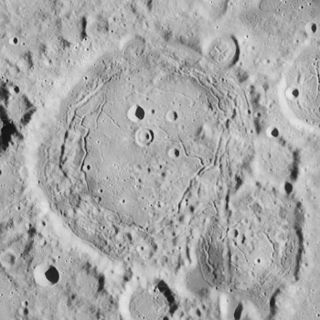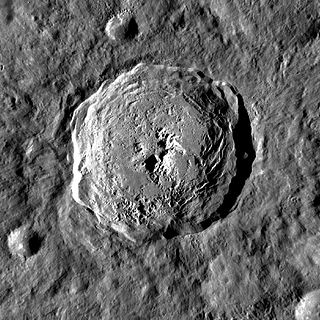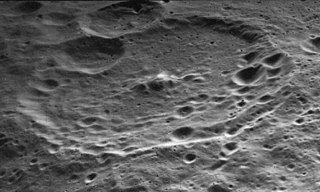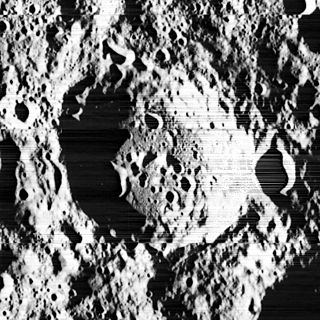
Zeeman is a lunar impact crater located on the far side of the Moon near its south pole. It is not directly visible from the Earth. To the northwest of Zeeman lies the crater Numerov. Southeast of the rim is the crater Ashbrook.

Doppler is a lunar impact crater named for Christian Doppler that is located at the southern edge of the walled plain Korolev, on the far side of the Moon. To the east are the craters Das and Galois. Farther to the southwest of Doppler is Mohorovičić.

Arrhenius is a lunar impact crater that is located just on the far side of the Moon, near the southwest limb. In this location the vicinity of the crater can be viewed during favorable librations, although it is viewed from on edge. To the south-southeast is the worn crater Blanchard, and De Roy lies further to the west.

Fechner is a lunar impact crater that lies on the far side of the Moon's southern hemisphere, attached to the western rim of the large walled plain Planck. The eastern rim of Fechner intersects the Vallis Planck, a long, wide cleft in the surface that follows a course to the north-northwest. This valley intrudes into the southeastern rim of the crater, then continues northwards from the periphery of the northeast rim.

Beijerinck is a lunar impact crater on the far side of the Moon. It lies to the south of the larger crater Chaplygin, and to the northeast of the huge walled plain Gagarin.

Cusanus is a lunar impact crater that is located near the northeastern limb of the Moon. In this location the crater appears very foreshortened when observed from the Earth, and its visibility is affected by libration. The northern rim of Cusanus is nearly joined to the south-southeastern rim of the larger crater Petermann. To the west is Baillaud and to the southeast is Hayn.

Cori is a lunar impact crater that is located in the southern hemisphere on the far side of the Moon. It lies less than one crater diameter to the north of the crater Baldet. To the northeast is the crater Grissom. It is named after Gerty Cori, the first American woman to win the Nobel Prize and the first woman to win the prize in the category Nobel Prize in Physiology or Medicine.

Chrétien is a lunar impact crater that is located in the southern hemisphere on the far side of the Moon from the Earth. It lies due south of the Mare Ingenii, one of the few maria on the Moon's far side. The crater lies in the midpoint between the craters Garavito to the west-southwest and Oresme to the east-northeast, both of these being somewhat smaller than Chrétien.

Mendeleev is a large lunar impact crater that is located on the far side of the Moon, as seen from the Earth. The southern rim of this walled plain just crosses the lunar equator. Intruding into the eastern rim of Mendeleev is the crater Schuster. Nearly on the opposite side, the smaller Hartmann intrudes into west-southwestern rim.

Carnot is a large crater in the northern part of the Moon's far side. It was named after Nicolas L. S. Carnot by the IAU in 1970.

Dyson is a lunar impact crater, 63 kilometers in diameter, that lies on the far side of the Moon, past the northwest limb. It is located in the northern part of the surface, to the northwest of the crater Coulomb, and east of van't Hoff.

Lavoisier is a lunar impact crater that is located near the northwestern limb of the Moon, at the western edge of the Oceanus Procellarum. It is named after the French chemist Antoine Lavoisier. It is located to the southwest of the crater von Braun and southeast of Bunsen. Due south of Lavoisier is the disintegrated crater Ulugh Beigh.

Jackson is a prominent lunar impact crater that is located in the northern hemisphere on the far side of the Moon. Less than one crater to the northeast is the crater Mineur, and to the south-southwest lies McMath.

Chauvenet is a lunar impact crater that is located to the northeast of the prominent crater Tsiolkovskiy on the far side of the Moon. Less than one crater diameter to the northwest of Chauvenet is the crater Ten Bruggencate.

Kibalʹchich is a crater on the Moon's far side. It lies to the northeast of the large walled plain Korolev, and is attached to the southeastern outer rim of the crater Tsander.

Marconi is a lunar impact crater that is located on the Moon's far side. It lies to the northwest of the large walled plain Gagarin, and to the southwest of the prominent crater Chaplygin. To the west-northwest of Marconi is the slightly larger Dellinger.

Maksutov is a crater on the far side of the Moon. It is located just to the south-southwest of the larger walled plain Oppenheimer. To the southwest lies the crater Nishina, and to the west-northwest is the merged crater pairing of Davisson and Leibnitz.

Schuster is a lunar impact crater that lies along the eastern rim of the much larger walled plain Mendeleev, on the far side of the Moon. To the east of Schuster is the crater Henderson, and to the southeast lies the large Chaplygin.

Schliemann is a lunar impact crater on the far side of the Moon. It is located just to the northwest of the somewhat larger crater Ventris, and to the northeast of the prominent Chaplygin. Farther to the northeast of Schliemann is the large Mandel'shtam.

Vilʹev is an eroded lunar impact crater that is located on the far side of the Moon. It lies to the west of the much larger crater Chaplygin, and to the north of Marconi. Just to the northeast of Vilʹev is the small crater pair of van den Bos and Tamm. Slightly farther to the west is the larger crater pair of Pannekoek and Dellinger.

























